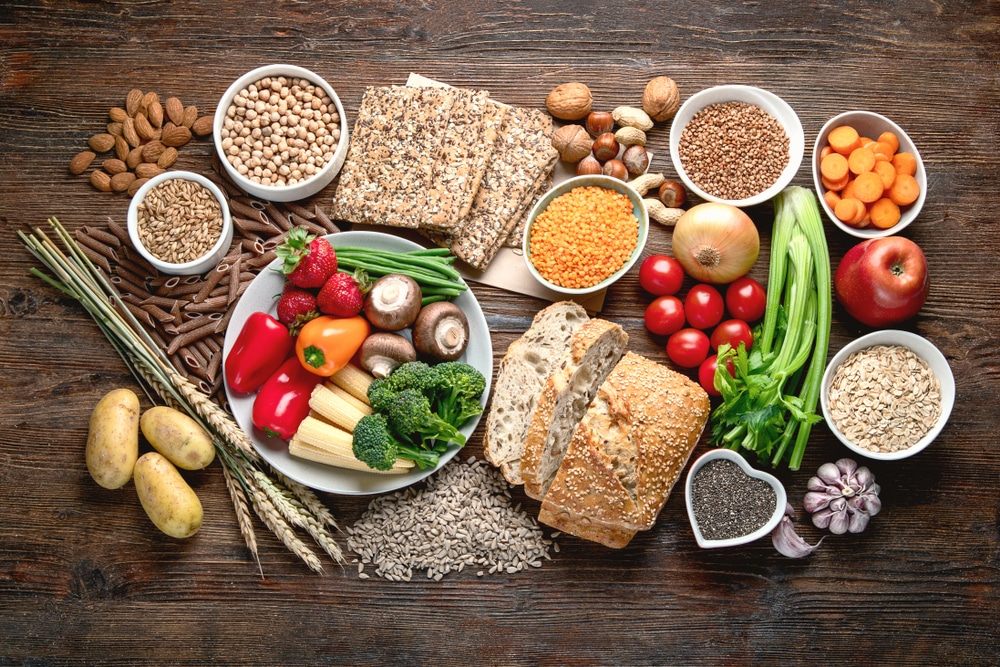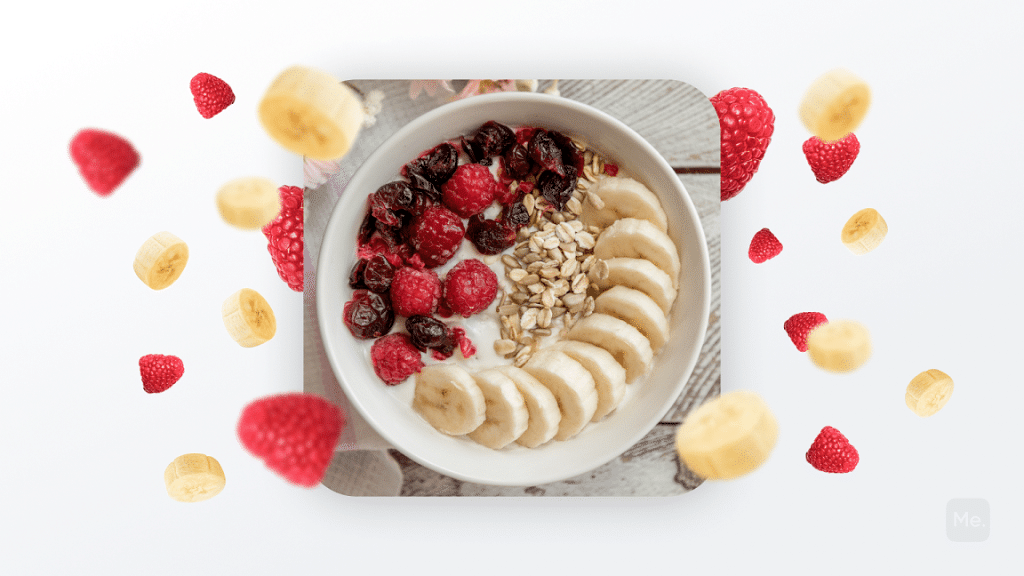The fiber in our diets is an essential part of a healthful diet. However, sometimes when a person eats too much fiber too quickly, it can cause digestive problems. It is important to consume the right amount of fiber each day, spread throughout the day.
In this article, you will learn about the types of dietary fiber, what is the daily recommended fiber intake, and what are the side effects of too much fiber. If you suspect that you have eaten a large amount of food containing a significant amount of fiber, keep reading to find out what to do.
Types Of Dietary Fiber
Dietary fibers can be classified as soluble or insoluble (18).
Soluble Fiber
Soluble fiber is dissolvable in water and often is partly fermented by bacteria in the digestive tract (13).
Food with soluble fibers include:
- Oatmeal
- Seeds
- Nuts
- Beans
- Lentils
- Fruit pectins
- Barley
- Psyllium (Metamucil)
- Citrus fruits
Soluble fiber takes a bit longer to digest, so it can have a more lasting effect on blood sugar levels compared to insoluble fibers. Foods high in soluble fiber are also very filling, so they tend to help with weight management.
Insoluble Fiber
Insoluble fiber cannot be dissolved in water or generally digested by intestinal bacteria (18).
Foods with insoluble fibers include:
- Whole-wheat flour
- Wheat bran
- Whole grains
- Vegetables
- Fruit skin and seeds
This type of fiber does not break down in the stomach or intestines and helps to increase stool bulk. These foods help food and waste pass through the digestive tract more quickly, which could protect you from constipation.
Read More: Is Fiber A Carbohydrate? Here’s What You Need To Know
What Is The Daily Recommended Fiber Intake?
The daily recommended intake of fiber is at least 14 grams for every 1000 calories consumed (11). For example, a person who eats 2000 calories per day should consume at least 28 grams of fiber each day regardless of age or gender.
However, this number varies depending on a person’s circumstances, such as weight and activity level. A person who is very physically active or works in a labor-intensive job may need to consume more than the daily recommended amount of fiber each day.
The current Dietary Guidelines for Americans recommend the following approximate daily intake (3):
- Children aged 1 to 3: 14 grams
- Children aged 4 to 8: 17 to 20 grams
- Adolescents aged 9 -13: 22 to 25 grams
- Teenagers aged 14-18: 25 to 31 grams
- Adult men: 34 grams
- Adult women: 28 grams
How Much Fiber Is Too Much?
Eating more than 70 grams of fiber a day is probably too much (7). For some people, anything above 40 grams will cause uncomfortable symptoms.
Some of the signs that you’ve had too much fiber include:
- Nausea
- Gas
- Feeling too full too quickly or decreased appetite
- Dehydration
- Stomach cramps
Side Effects Of Too Much Fiber
Eating too much fiber can have the following negative side effects:
Abdominal Pain
Some people experience abdominal discomfort when eating high-fiber foods such as beans, nuts, and seeds (14). This could lead to gastrointestinal bleeding if the pain lasts for more than a few days, so it is important to see a doctor if this occurs.
Bloating
A person who eats a large amount of fiber may experience temporary bloating because the food takes a long time to pass through the digestive system (8).
Diarrhea
If a person eats too much fiber too quickly, it can cause diarrhea that can eventually lead to dehydration. This is particularly true for those who have weakened immune systems. This type of diarrhea does not last long and usually disappears as the body gets used to eating more fiber.
Constipation
It is possible that eating too much fiber at once can cause constipation because of the increased bulk of food in the digestive tract (12). In some cases, this has been known to cause bowel obstruction or rectal blockage. It is important to speak with a healthcare professional if you experience a sudden change in your bowel habits.
If you wish to free yourself from all the extra pounds that have been weighing you down for way too long, start using the BetterMe app and overhaul your entire life!
Reduced Blood Sugar Levels
Both fiber and whole grains can help manage blood sugar levels by slowing down the rate at which carbohydrates are absorbed into the bloodstream.
This is why people who suffer from diabetes are encouraged to eat high-fiber foods rather than refined carbohydrates like white rice. However, excess fiber intake could lead to further drops in blood sugar levels which can cause dizziness or irritability, especially if you are on diabetes medication. If you have diabetes and are trying to increase your fiber intake, do it gradually and check your blood sugars often. Speak to your doctor if you are frequently experiencing hypoglycemia.
Nutrient Deficiencies
Although rare, over time, eating too much fiber from whole grains and vegetables could lead to certain nutrient deficiencies. For example, a person who eats a diet high in insoluble fibers may not get enough of the following nutrients:
- Vitamin C
- Calcium
- Iron
- Zinc
- Magnesium
- Phosphorus
- Copper
This is because too much fiber can interfere with the body’s ability to absorb essential nutrients (9). The fiber binds with minerals and interferes with the absorption process (10).
Temporary Weight Gain
A person who eats too much fiber without ingesting enough water could experience temporary weight gain because the unabsorbed food adds bulk to the stool. This extra volume causes an increase in stool volume which can be seen as increased overall weight.
What To Do If You Eat Too Much Fiber?
If you suspect that you have eaten too much fiber, or if any of these symptoms sound like something you’ve experienced, your first step should be to reduce your fiber consumption. Temporarily eliminate fibrous fruits and vegetables from your diet right away.
Other options include:
Get More Exercise
Exercise can help relieve constipation because it stimulates the muscles of the intestines. It also has an impact on gut microbiota which is essential for gastric motility, which is how food moves through your digestive tract (6).
Read More: Aerobic Exercises At Home: Lose Weight At Your Convenience & With Minimal Equipment
Increase Fluid Consumption
Drinking fluids will help move the fiber through the digestive tract faster. It is best to drink at least 8 ounces of water or other fluid with each meal that contains more than 4 grams of fiber.
Eat Smaller Meals
Instead of eating large amounts of food at once, eat smaller meals throughout the day. This will help you to maintain a steady intake of fiber without overwhelming your digestive system.
Reduce Stress
Stress may worsen gas and bloating because it slows down digestion (15). Take up meditation or another relaxing activity to help reduce stress levels.
Avoid Food That Increases Bloating
Some foods are more likely to cause bloating than others.
These include:
- Beans and legumes
- Whole grains
- Cabbage family vegetables, such as broccoli and cauliflower
- Nuts and seeds
- Onions
Avoiding these foods can help ease the discomfort unit, then you’re ready to eat normally again.
Low Fiber Diets
It is important to note that the effects of high fiber consumption vary from person to person. Some people tolerate high fiber diets extremely well, while others will experience negative side effects after only a few days. Most people can tolerate increasing their fiber intake as long as they do it gradually. If you suspect that your body truly cannot handle a high fiber diet, speak with your health care provider about starting a lower-fiber diet instead.
A low fiber diet comprises:
- No more than 10 grams of fiber per day
- Limited amounts of whole grains and leafy greens
- Well-cooked meats
Yanking yourself back in shape has never been so easy with our game-changing fitness app! Start transforming your life with BetterMe!
Benefits Of Fiber In The Diet
A good balance of fiber in the diet is associated with several health benefits, including:
Prevent Constipation
The average American only ingests 16 grams of fiber each day, which is well below the recommended amount (17). Since fiber acts like a sponge in the digestive tract by absorbing water and increasing stool size, not getting enough can lead to constipation (4). The symptoms of constipation include infrequent bowel movements that are hard, dry, or lumpy stools.
Increase Satiety For Weight Management
One key to weight management is feeling full and satisfied. Fiber helps you feel fuller longer by slowing stomach emptying so your body has more time to signal you when you’re full (1).
Stabilize Blood Sugar
For people with diabetes, fiber may play an important role in managing blood glucose levels. According to the American Diabetes Association, soluble fiber in particular may help reduce blood sugar by slowing carbohydrate absorption in the intestine (5).
Improve Gut Health
Fiber is beneficial to gut health because it stimulates the movement of your bowels without causing diarrhea (as long as you don’t overdo it). It also helps with digestion and nutrient absorption by reaching deep into your large intestine, where things are broken down into usable nutrients that nourish you (16).
Reduce Risk Of Disease
Eating a diet high in fiber has been associated with many different health benefits, including reducing the risk of heart disease, diabetes, obesity, certain types of cancer, and inflammatory bowel disease (2).
The Bottom Line
Eating too much fiber can cause several negative side effects. To reduce digestive discomfort, reduce your daily fiber intake. If you have high blood sugar levels, eating too much fiber can interfere with your blood sugar management and lead to further drops in blood sugar levels. Make sure that you are drinking enough fluid when you eat a meal that contains more than 4 grams of fiber to keep the fiber from causing complications. If you want to increase your fiber intake, do it gradually to avoid uncomfortable side effects.
DISCLAIMER:
This article is intended for general informational purposes only and does not address individual circumstances. It is not a substitute for professional advice or help and should not be relied on to make decisions of any kind. Any action you take upon the information presented in this article is strictly at your own risk and responsibility!
SOURCES:
- Dietary fibre and satiety (2007, onlinelibrary.wiley.com)
- Dietary fibre and the prevention of chronic disease – should health professionals be doing more to raise awareness? (2016, onlinelibrary.wiley.com)
- Dietary Guidelines for Americans 2020 – 2025 (2020, dietaryguidelines.gov)
- Effect of dietary fiber on constipation: A meta analysis (2012, ncbi.nlm.nih.gov)
- Effects of Dietary Fiber and Carbohydrate on Glucose and Lipoprotein Metabolism in Diabetic Patients (1991, care.diabetesjournals.org)
- Exercise Modifies the Gut Microbiota with Positive Health Effects (2017, ncbi.nlm.nih.gov)
- Fiber How Much is Too Much? (n.d., studentaffairs.duke.edu)
- Inhibitory actions of a high fibre diet on intestinal gas transit in healthy volunteers (2004, gut.bmj.com)
- Metabolic Effects of Dietary Fiber Consumption and Prevention of Diabetes (2008, academic.oup.com)
- Mineral binding capacity of dephytinized insoluble fiber from extruded wheat, oat and rice brans – Plant Foods for Human Nutrition (1997, link.springer.com)
- Most Americans are not getting enough fiber in our diets (2021, nutrition.org)
- Myths and misconceptions about chronic constipation (2005, pubmed.ncbi.nlm.nih.gov)
- Soluble Dietary Fiber – an overview (n.d., sciencedirect.com)
- Stopping or reducing dietary fiber intake reduces constipation and its associated symptoms (2020, ncbi.nlm.nih.gov)
- Stress and The Sensitive Gut – Harvard Health Publishing – Harvard (2019, health.harvard.edu)
- The Health Benefits of Dietary Fibre (2020, ncbi.nlm.nih.gov)
- Trends in Dietary Fiber Intake in the United States, 1999-2008 (2012, jandonline.org)
- “Dietary fibre”: moving beyond the “soluble/insoluble” classification for monogastric nutrition, with an emphasis on humans and pigs (2019, jasbsci.biomedcentral.com)

















